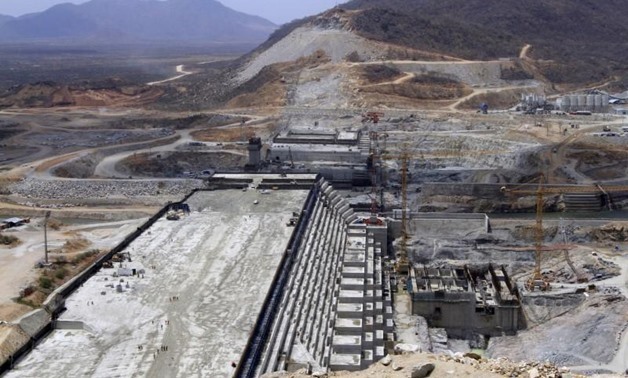
A general view of Ethiopia's Grand Renaissance Dam, as it undergoes construction, is seen during a media tour along the river Nile in Benishangul Gumuz Region, Guba Woreda, in Ethiopia March 31, 2015. - Picture taken March 31, 2015. REUTER/Tiksa Negeri
CAIRO-14 May 2018: The ministers of irrigation and water resources as well as the chiefs of intelligence services of Sudan, Egypt and Ethiopia will hold a meeting on Ethiopian Grand Renaissance Dam (GERD) in Addis Ababa, Ethiopia, on Tuesday.
Foreign Ministry spokesperson, Ahmed Abu Zeid, referred that the meeting aims to follow up the results of the round of discussions that took placebetween Egypt, Ethiopia, and Sudan over the GERDon April 4 in Khartoum.
In this regard, Abu Zeid expressed Egypt’s aspiration to find solutions for the disagreement over the technical issues related to the dam’s impact on the downstream countries of Egypt and Sudan and resume the studies agreed upon in the Declaration of Principles in 2015.
Previously, amid a serious deadlock in talks over the stalling of the technical studies of the disputed dam, Egypt suggested including the World Bank as a neutral mediator in the tripartite technical committee’s talks on the GERD.
However, on January 21, Ethiopia announced its rejection of the suggestion.
Egypt depends entirely on Nile water for drinking and irrigation purposes, reiterating consistently its "historical right" to the river guaranteed in the 1929 and 1959 Nile agreements, which granted the country 87 percent of Nile water and the right to veto or approve irrigation projects in the upstream countries.
Since 2014, the three countries have held several tripartite meetings and agreed on the Declaration of Principles. However, the disagreement amongthe countries is relatedto the filling and operation period of the dam; Egypt demands that this period be sevento 10 years, while Ethiopia insists on a maximum of three years.
Egypt’s average water per-capita is expected to drop from 663 cubic meters per year to 582 cubic meters by 2025, according to the Central Agency for Public Mobilization and Statistics (CAPMAS). Addis Ababa, however, claimed that the dam is necessary for Ethiopia’s development and will not harm downstream countries.
In 2011, Ethiopia started the construction of the 6,000-megawatt Renaissance Dam over the Blue Nile River, one of the major sources of water that forms the Nile River downstream. Concerns have risen in Cairo and Khartoum over the negative impact the Ethiopian dam will have on their historic Nile water share, amounting to 55.5 billion cubic meters in Egypt only, in accordance with the historic 1959 agreement with Sudan.

Comments
Leave a Comment